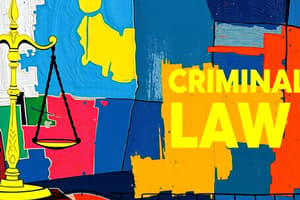Podcast
Questions and Answers
When is a person guilty of an offense?
When is a person guilty of an offense?
- When the person has the requisite degree of culpability for each element
- Both A and B (correct)
- When the person's liability is based on conduct that includes a voluntary act
- When the person's liability is based on conduct that includes an omission to perform an act or duty
When is culpability not required for a person to be guilty of an offense?
When is culpability not required for a person to be guilty of an offense?
- When the language defining an offense specifies a degree of culpability
- When the language defining an offense plainly indicates a purpose to impose strict criminal liability
- When the language defining an offense does not specify any degree of culpability and plainly indicates a purpose to impose strict criminal liability (correct)
- When the language defining an offense does not specify any degree of culpability
What is established when the language defining an element of an offense related to knowledge or intent neither specifies culpability nor plainly indicates a purpose to impose strict liability?
What is established when the language defining an element of an offense related to knowledge or intent neither specifies culpability nor plainly indicates a purpose to impose strict liability?
- The element of the offense is established only if a person has the requisite degree of culpability
- The element of the offense is established only if a person acts recklessly (correct)
- The element of the offense is established only if a person performs a voluntary act
- The element of the offense is established only if a person performs an omission to perform an act or duty
Voluntary intoxication may be admissible as evidence to show whether or not the person was physically capable of performing the act with which the person is charged.
Voluntary intoxication may be admissible as evidence to show whether or not the person was physically capable of performing the act with which the person is charged.
Possession is considered a voluntary act if the possessor knowingly procured or received the thing possessed, or was aware of the possessor's control of the thing possessed for a sufficient time to have ended possession.
Possession is considered a voluntary act if the possessor knowingly procured or received the thing possessed, or was aware of the possessor's control of the thing possessed for a sufficient time to have ended possession.
What does 'culpability' mean?
What does 'culpability' mean?
Which of the following is true about voluntary intoxication in determining the existence of a mental state that is an element of a criminal offense?
Which of the following is true about voluntary intoxication in determining the existence of a mental state that is an element of a criminal offense?
Which of the following is considered an involuntary act?
Which of the following is considered an involuntary act?
What does 'culpability' mean in this section?
What does 'culpability' mean in this section?
When is a person guilty of an offense?
When is a person guilty of an offense?
When is culpability not required for a person to be guilty of an offense?
When is culpability not required for a person to be guilty of an offense?
What is established when the language defining an element of an offense related to knowledge or intent neither specifies culpability nor plainly indicates a purpose to impose strict liability?
What is established when the language defining an element of an offense related to knowledge or intent neither specifies culpability nor plainly indicates a purpose to impose strict liability?
Flashcards are hidden until you start studying





